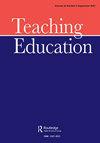有效的合作教学:特殊和普通教育工作者对合作的看法
IF 1.1
Q2 EDUCATION & EDUCATIONAL RESEARCH
引用次数: 8
摘要
摘要令人惊讶的是,很少有研究分析特殊教育工作者和普通教育工作者之间的合作被证明是有效的。本研究的目的是探讨特殊教育工作者和普通教育工作者对他们在教育接受特殊教育援助的学生方面的合作努力的看法。该研究采用了定性方法,对八名教育工作者的访谈进行了分析,以确定这两个教育专业之间成功合作的基本过程和机制。抽样是有目的的,只有过去被发现成功合作的教育工作者才被邀请参加。分析过程中出现了三个主要主题:教学的元分析方法、相互认可和热情以及包容性教育教学。研究结果的总体结论表明,成功的合作植根于支持包容性教育和欣赏多样性的基本前提的教学类型。愿意在实践和职业身份方面相互接近的教育专业人员更有能力在共同教学的情况下取得成功。本文章由计算机程序翻译,如有差异,请以英文原文为准。
Co-teaching that works: special and general educators’ perspectives on collaboration
ABSTRACT There are surprisingly few studies analysing collaboration between special and general educators that has been proven to work well. The aim of the present study is to explore the perspectives of special and general educators on their collaborative efforts on teaching pupils who receive special education assistance. The study adopts a qualitative approach where interviews with eight educators have been analysed to identify underlying processes and mechanisms that are characteristic of successful collaboration between these two educational professions. The sampling was purposive and only educators who have been found to have achieved successful collaboration in the past were invited to participate. Three main themes emerged during the analysis: a meta-analytic approach to teaching, mutual recognition and enthusiasm, and inclusive education teaching. The overall conclusion of the findings indicates that successful collaboration is embedded in the type of instruction that supports the basic premises of inclusive education and appreciation of diversity. Educational professionals who are willing to come closer to one another in terms of their practice and professional identities are better equipped to succeed in co-teaching situations.
求助全文
通过发布文献求助,成功后即可免费获取论文全文。
去求助
来源期刊

Teaching Education
EDUCATION & EDUCATIONAL RESEARCH-
CiteScore
3.80
自引率
6.20%
发文量
15
期刊介绍:
Teaching Education is an interdisciplinary forum for innovative practices and research in teacher education. Submission of manuscripts from educational researchers, teacher educators and practicing teachers is encouraged. Contributions are invited which address social and cultural, practical and theoretical aspects of teacher education in university-, college-, and school-based contexts. The journal’s focus is on the challenges and possibilities of rapid social and cultural change for teacher education and, more broadly, for the transformation of education. These challenges include: the impact of new cultures and globalisation on curriculum and pedagogy; new collaborations and partnerships between universities, schools and other social service agencies; the consequences of new community and family configurations for teachers’ work; generational and cultural change in schools and teacher education institutions; new technologies and education; and the impact of higher education policy and funding on teacher education. Manuscripts addressing critical and theory-based research or scholarly reflections and debate on contemporary issues related to teacher education, will be considered. Papers should attempt to present research, innovative theoretical and/or practical insights in relevant current literature and debate.
 求助内容:
求助内容: 应助结果提醒方式:
应助结果提醒方式:


